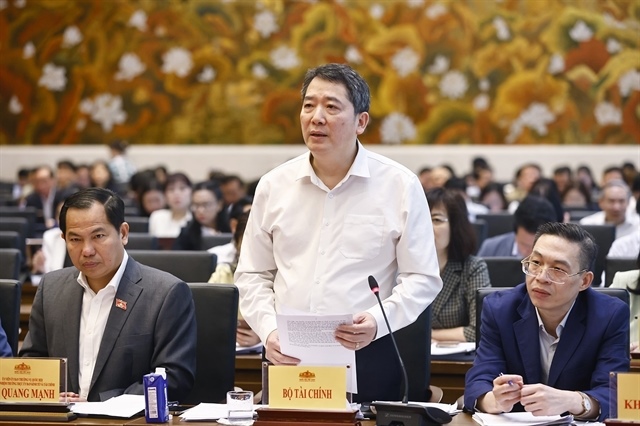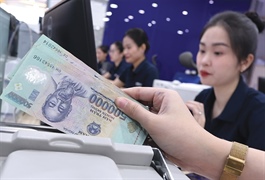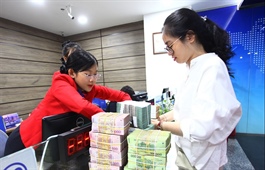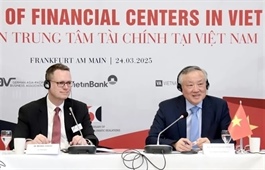NA deputies propose 10% corporate income tax for all press agencies
NA deputies propose 10% corporate income tax for all press agencies
During a meeting of the full-time National Assembly (NA) deputies held in Hà Nội on March 26, several delegates proposed a corporate income tax rate of 10 per cent for all press agencies, including print and electronic newspapers.

Deputy Minister of Finance Cao Anh Tuấn spoke at a meeting of the full-time National Assembly (NA) deputies held in Hà Nội on March 26. —VNA/VNS Photo |
The proposal aims to establish fairness among various forms of the press, align with the ongoing digital transformation, and bolster the sustainable development of the media industry, ensuring that newsrooms have more resources to invest in content and technology.
NA delegate Thạch Phước Bình, from Trà Vinh Province, pointed out that online media is increasingly becoming the primary source of news, while traditional print newspapers are witnessing a decline in readership.
In fact, he said, many printed newspapers have either reduced their operations or ceased publication altogether to focus on digital platforms. Despite these shifts, the tax policy has not kept pace with the evolving media landscape.
At present, printed newspapers benefit from a preferential 10 per cent corporate income tax rate, while electronic newspapers are taxed at a higher rate of 20 per cent.
Meanwhile, both forms of media serve the same public service purposes, such as disseminating official information, shaping public opinion, and fulfilling communication tasks for the Party and the State.
The different tax rates have led to a financial imbalance, particularly in the context of digital transformation, where many online newspapers are struggling with a decrease in advertising revenue.
The current tax policy has been particularly challenging for electronic news outlets that rely on advertising, content fees and digital services as primary sources of income.
Therefore, the delegates argued that applying a 10-per-cent tax rate for all types of press agencies would help level the playing field, provide financial relief and enable newsrooms to maintain operations and improve the quality of their content.
By offering the same tax rate to both print and electronic press, this proposal aligns with the digital transformation trend and encourages the sustainable growth of the media sector. It would also help local press agencies compete more effectively with global platforms.
Delegate Bình emphasised that adopting a uniform 10 per cent tax rate would improve the competitiveness of domestic press outlets, which are currently at a disadvantage when competing with large, cross-border platforms.
The proposal aims to support the press industry in overcoming financial difficulties, while ensuring it can continue to provide accurate and trustworthy information to the public.
Deputy Minister of Finance Cao Anh Tuấn said that, in light of the ongoing restructuring of the press industry, the proposal of applying a unified tax rate to all press agencies is timely and appropriate.
He confirmed that the drafting agency would work closely with the Economic and Financial Committee to review and implement this proposal in the upcoming National Assembly session.
At the same meeting, the Economic and Financial Committee noted that the current tax incentives for corporate income tax do not sufficiently encourage businesses to invest in research and development (R&D).
As a result, there is a growing need for more robust tax incentives, particularly in the form of additional deductions for R&D expenses, a strategy already successfully implemented by many countries to foster technological innovation and growth.
The Ministry of Finance, in collaboration with other relevant bodies, plans to revise the draft law to incorporate provisions that allow businesses to deduct additional expenses related to R&D activities.
Furthermore, the Government will be tasked with specifying the scope and conditions under which these deductions can be applied, thus encouraging technological advancement and innovation.
In addition to these revisions, the draft law will also address tax obligations for foreign organisations earning income from e-commerce and digital platforms. This includes both foreign enterprises with and without permanent establishments in Viet Nam.
The new provisions ensure that the tax treatment of income generated by foreign businesses operating in Việt Nam, through digital platforms, will align with existing tax regulations for local businesses. This adjustment aims to ensure consistency and fairness in the taxation system.
The Ministry of Finance will continue to study and refine the corporate income tax regulations, with a focus on fostering technological development, digital transformation, contributing to the implementation of the National Party's Resolution No 57-NQ/TW on scientific and technological breakthroughs.
- 08:43 27/03/2025




























